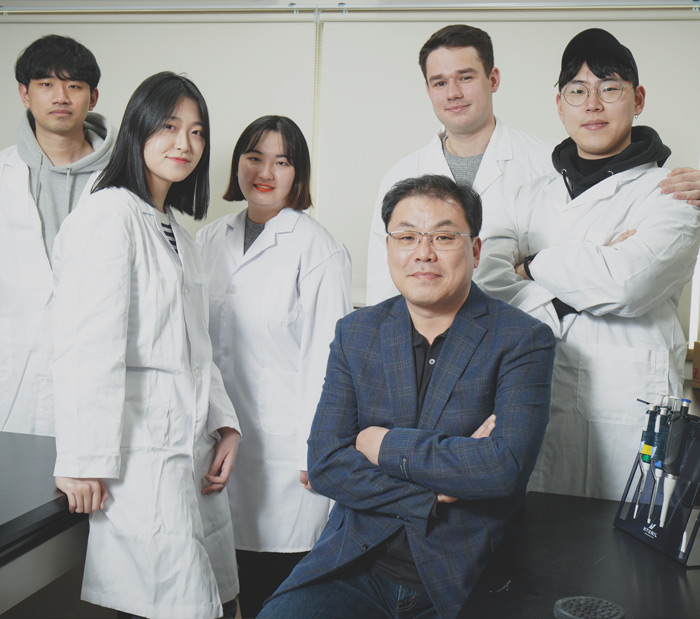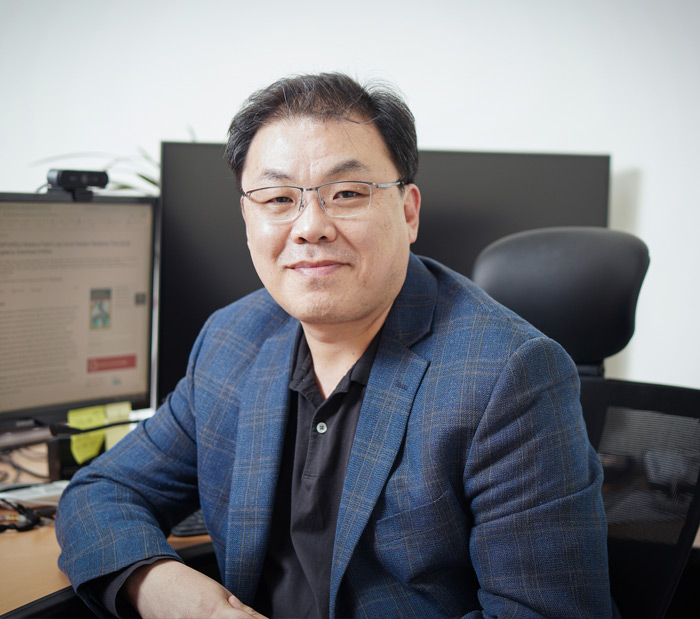Research Stories
Suggests Possibility of Applicable Personalized Cancer Therapy Using Radiation Therapy
The team found the pathogenic mutations of the critical anti-oxidant responsible genes are associated with radiation resistance and the inhibition of glutamine metabolic pathway known as an addicted pathway in lung cancer may allow personalized re-sensitizing KEAP1/NFE2L2-driven NSCLC.
Integrative Biotechnology
Prof.
JEON, YOUNG-JUN
- The current study shows that the mutations in KEAP1/NFE2L2 genes have a power to predict for local recurrence of the patients after radiation therapy.
- The resistance evoked by these mutations may allow personalized radiosensitization of KEAP1/NFE2L2-driven NSCLC, suggesting that the concept of the cancer personalization could be extended to radiation therapeutics.
Figure 1. Schematic diagram showing the study design about which the KEAP1/NFE2L2 mutations are predictive biomarkers of local recurrence after radiation treatment in NSCLC
Image Excepted : Cancer Discovery DOI:10.1158/2159-8290.CD-20-0282
Young-Jun Jeon’s research teams in the department of Integrative Biotechnology, Sungkyunkwan university published that the mutations in KEAP1/NFE2L2 gene could predict local recurrence of the NSCLC patients after radiation therapy. This study was done by collaboration with Stanford University and supported by NRF grant (NRF-2020R1F1A1071579).
Personalized cancer therapy has not been routinely applied to the cancer patients using radiation therapy. To this end, the teams analyzed 232 consecutive patients with localized NSCLC using next generation sequencing (NGS) analysis and found that an important anti-oxidant responsible factor, KEAP1/NFE2L2 genes harboring oncogenic mutations were highly correlated with the local recurrence of NSCLC patients after radiation therapy but not surgery. Subsequently they generated CRISPR-knocked out lung cancer cell lines for KEAP1 genes to test whether a patient derived-KEAP1 or NFE2L2 mutation has oncogenic property and found the pathogenic mutations of the critical anti-oxidant responsible genes are associated with radiation resistance. Also, subsequent cell biological approaches revealed that the inhibition of glutamine metabolic pathway known as an addicted pathway in lung cancer may allow personalized re-sensitizing KEAP1/NFE2L2-driven NSCLC.
Figure 2. Strategy for assessing KEAP1/NFE2L2 mutation functional classification using isogenic lung cancer cell lines
This study not only claimed the cancer personalization applicable to treatment strategy with radiation therapy in other localized cancers but also suggest a new paradigm in the personalized cancer therapeutics. These results featured on the cover in Cancer Discovery (Vol 10, Issue 12), a top ranked journal in the fields of Oncology (Impact factor – 29.497).
Young-Jun Jeon’s research team is currently developing a NGS library platform to analyze circulating tumor nucleic acids from patient blood plasma as a liquid biopsy tool, which will be eventually applied to identify novel mechanistic and prognostic biomarkers by combining cancer biological approaches.


